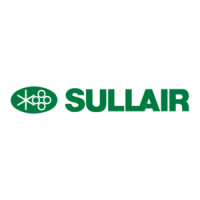Section 1
5
SAFETY
1.1 GENERAL
Sullair and its subsidiaries design and manufacture
all of their products so they can be operated safely.
However, the responsibility for safe operation rests
with those who use and maintain these products. The
following safety precautions are offered as a guide
which, if conscientiously followed, will minimize the
possibility of accidents throughout the useful life of
this equipment.
The compressor should be operated only by those
who have been trained and delegated to do so, and
who have read and understood this Operator's
Manual. Failure to follow the instructions, procedures
and safety precautions in this manual may result in
accidents and injuries. NEVER start the compressor
unless it is safe to do so. DO NOT attempt to operate
the compressor with a known unsafe condition. Tag
the compressor and render it inoperative by
disconnecting and locking out all power at source or
otherwise disabling its prime mover so others who
may not know of the unsafe condition cannot attempt
to operate it until the condition is corrected.
Install, use and operate the compressor only in full
compliance with all pertinent OSHA regulations and/
or any applicable Federal, State, and Local codes,
standards and regulations. DO NOT modify the
compressor and/or controls in any way except with
written factory approval.
While not specifically applicable to all types of
compressors with all types of prime movers, most of
the precautionary statements contained herein are
applicable to most compressors and the concepts
behind these statements are generally applicable to
all compressors.
1.2 PERSONAL PROTECTIVE
EQUIPMENT
A. Prior to installing or operating the compressor,
owners, employers and users should become
familiar with, and comply with, all applicable
OSHA regulations and/or any applicable Federal,
State and Local codes, standards, and regula-
tions relative to personal protective equipment,
such as eye and face protective equipment,
respiratory protective equipment, equipment
intended to protect the extremities, protective
clothing, protective shields and barriers and elec-
trical protective equipment, as well as noise
exposure administrative and/or engineering con-
trols and/or personal hearing protective equip-
ment.
1.3 PRESSURE RELEASE
A. Install an appropriate flow-limiting valve between
the service air outlet and the shut-off (throttle)
valve, either at the compressor or at any other
point along the air line, when an air hose exceed-
ing 1/2" (13mm) inside diameter is to be con-
nected to the shut-off (throttle) valve, to reduce
pressure in case of hose failure, per OSHA Stan-
dard 29 CFR 1926.302(b)(7) and/or any applica-
ble Federal, State and Local codes, standards
and regulations.
B. When the hose is to be used to supply a mani-
fold, install an additional appropriate flow-limiting
valve between the manifold and each air hose
exceeding 1/2" (13mm) inside diameter that is to
be connected to the manifold to reduce pressure
in case of hose failure.
C. Provide an appropriate flow-limiting valve at the
beginning of each additional 75 feet (23m) of
hose in runs of air hose exceeding 1/2" (13mm)
NOTE
OPERATOR IS REQUIRED TO READ
ENTIRE INSTRUCTION MANUAL.

